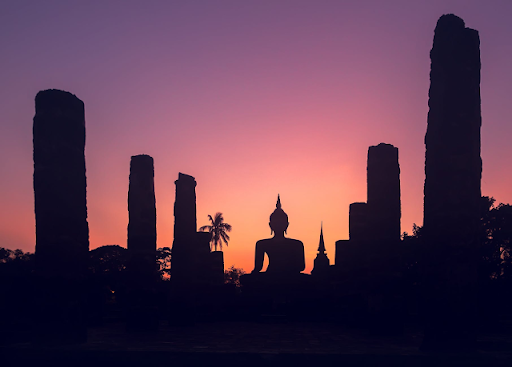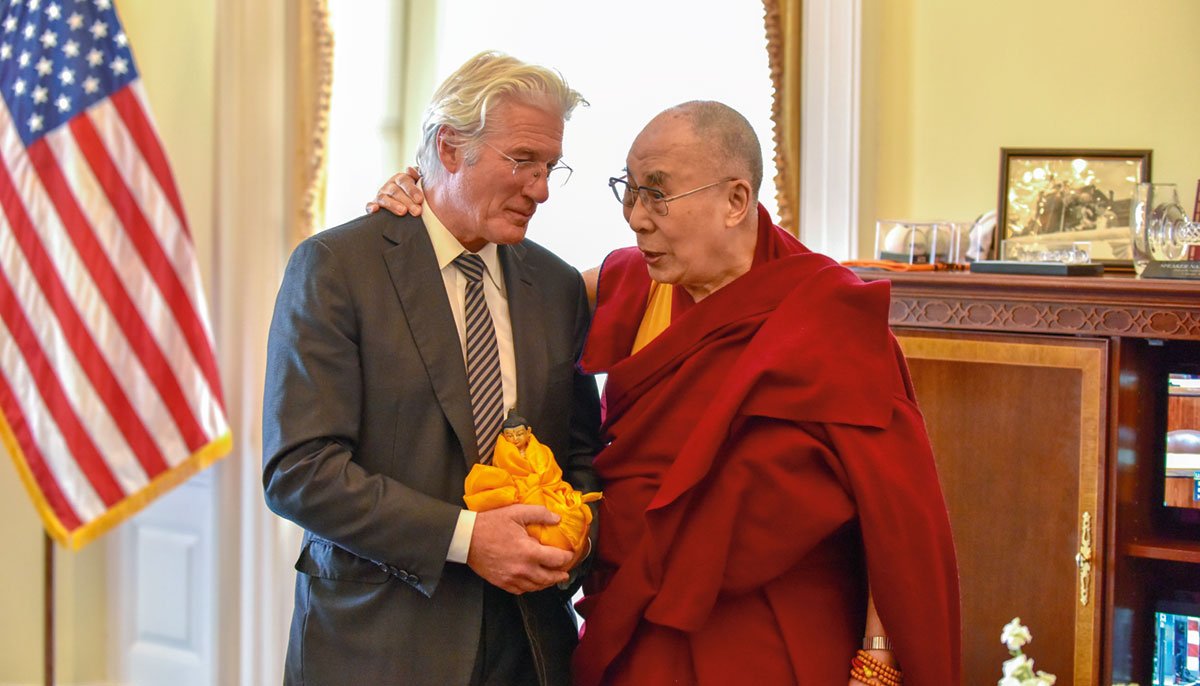Richard Gere With Melvin McLeod of Lion's Roar...
Photo by Richard Ellis / Alamy Stock Photo
Melvin McLeod: How did you first make your connection to the Dalai Lama and the people of Tibet?
Richard Gere: Well, it’s a long story, as most of these are long stories, but I’ll make it as brief as I can. In my early twenties, I was searching to make sense of myself in the world. Zen was what captured my imagination. I was a student of Zen for many years and had a regular practice that came from that.
When I was in my late twenties, I went to Asia for the first time. My first film was at the Cannes Film Festival, and I took the opportunity after Cannes to go to India and Nepal. That was the first time I met Tibetans, in a refugee camp outside of Pokhara in Nepal.
I was struck by the utter normalcy of His Holiness, and how quickly he was able to get past my defenses and my romanticism.
I was kind of floored by the experience. I felt it was otherworldly, but really it’s not otherworldly. It’s the world. We’re the ones who are otherworldly. We live in a hallucinated view of the world, while I saw that these people seem to be completely centered in the world that they inhabit. It was a different feeling than around my Japanese Zen teachers and fellow students, as incredibly profound to me as Zen was. Something else was going on there.
A few years later, I had a strong impulse to meet His Holiness the Dalai Lama. I didn’t know anything about the political situation—I thought you could just go to Tibet and if you were really lucky, you got to meet the Dalai Lama. But my friend John Avedon, who had just finished his book In Exile from the Land of Snows, said, look, if you want to meet the Dalai Lama, he’s not in Tibet anymore. He’s in India.
So I went to Dharamsala. This was in the early eighties. I had met the great Nyingma teacher Dudjom Rinpoche in New York before that, and was profoundly moved by him. I had some letters of introduction, and eventually, after a couple of weeks during the monsoon in Dharamsala, I got to see His Holiness.
I saw him for maybe half an hour, forty-five minutes, but it felt simultaneously like it was one minute and ten hours, because it was so, so dense. I was struck by the utter normalcy of His Holiness, and how quickly he was able to get past my defenses and my romanticism. I pretty much changed my life at that point. I left Dharamsala and went right on a long trek through Ladakh and Zanskar. And I’ve been kind of on a trek ever since.
What is it like having the Dalai Lama of Tibet, the world’s best known Buddhist, one of the great spiritual figures of our time, as your personal teacher?
You said you were going to ask me this, and I started thinking about it and how I’ve had to navigate many different relationships with His Holiness. Clearly my favorite relationship is as a student of his, a very humble student. But I’m also an organizer for him. I do political work, I do cultural work with him, we organize teachings, we do a lot of different things. It’s been kind of a challenge to navigate all these different types of relationships with His Holiness and know him from these different angles, and I still stumble once in awhile.
But if anyone goes to a teaching by His Holiness, they’ll also encounter all these different possibilities of how to engage his mind and his heart. He’s definitely involved in the world—he wants the world to be genuine and peaceful and egalitarian and fair. He’s involved with human rights and civil rights and how we behave toward each other.
But equally—I would say even more so—as a Buddhist teacher he’s primarily concered with liberation. That’s the goal. And there are two sides of that. You have relative bodhichitta, compassion, and absolute bodhichitta, wisdom, which you are working on constantly. I’ve never seen anyone on this planet, in this time, who is able to do both so completely as the Dalai Lama—to be involved in the world in a rational, sane way, and also be completely transcendent.
The wonderful irony of the situation is that what we do for others to make them happy is what will make us happy.
Starting with your first experience of the Tibetan people in the refugee camp outside Pokara, and then through your many years knowing the Dalai Lama, what have you seen as the most important value or lesson the rest of the world can learn from His Holiness and Tibetan culture?
That the best way to navigate the world we live in, samsara, is through a sense of universal responsibility. That there’s no one outside of our concern. There’s no thing outside of our concern. To the extent that we are able to develop ourselves, we are responsible for the whole universe. Once, I was really tired from doing a lot of work in Washington and around the world, and I said to His Holiness, “Can I stop now?” He replied: “Yes. When I stop.”
Of course, he’s a bodhisattva, so he’s not going to stop until every being is liberated, and that feeling has completely saturated Tibetan culture. You know, they didn’t have roads in Tibet because they were so careful about the insects in the ground. Digging for the roads took forever because every spoonful of dirt had to be examined to make sure there were no insects who were going to be hurt or killed in the process.
I mean, that’s deep concern. That’s not pretend. You know, we’re basically good people. We call ourselves good people. And we care about each other. But it’s a pretty surface responsibility we have. This deep sense that we are all deeply connected and deeply responsible for each other is something that over the centuries, certainly since the introduction of Buddhism in the seventh century, has saturated Tibetan culture and life. It’s palpable. You feel it.
And according to Buddhist teachers like the Dalai Lama, this universal concern for the well-being of others is not only the key to a happy and sustainable society, it’s actually the secret to our own happiness. Which is not usually the way we think.
Every once in a while I go back to to reread and rethink the basics of Buddhism. I was reading a book recently by one of my teachers, Lama Thubten Zopa Rinpoche, on the basic things that we get wrong. One mistake is that what we take to be happiness is really just pleasure. It’s the sugar rush of sensual pleasure, or an imagined sense that if we have more money we’re happier or more secure, whatever those things may be. But these are very surface, short-lived things we are all caught up in. The wonderful irony of the situation is that what we do for others to make them happy is what will make us happy. In the fullness way beyond time, that’s what will make us happy.




Comments
Post a Comment
RN USA no longer accepts comments. The information presented is for reflection, contemplation, and for those seeking greater understanding and wisdom. It is for seekers and those with an open mind and heart.
Namaste